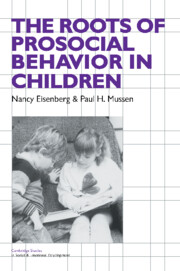Book contents
- Frontmatter
- Contents
- Preface
- 1 Introduction
- 2 Methodological and theoretical considerations in the study of prosocial behavior
- 3 Biology and prosocial behavior
- 4 Culture and prosocial behavior
- 5 “Person” variables and prosocial behavior
- 6 Socialization in the family
- 7 Socialization by agents outside the family
- 8 Cognition, role taking, interpersonal problem solving, and moral judgment
- 9 Emotional factors in prosocial behavior
- 10 Situational determinants
- 11 Conclusions
- References
- Name index
- Subject index
5 - “Person” variables and prosocial behavior
Published online by Cambridge University Press: 31 December 2009
- Frontmatter
- Contents
- Preface
- 1 Introduction
- 2 Methodological and theoretical considerations in the study of prosocial behavior
- 3 Biology and prosocial behavior
- 4 Culture and prosocial behavior
- 5 “Person” variables and prosocial behavior
- 6 Socialization in the family
- 7 Socialization by agents outside the family
- 8 Cognition, role taking, interpersonal problem solving, and moral judgment
- 9 Emotional factors in prosocial behavior
- 10 Situational determinants
- 11 Conclusions
- References
- Name index
- Subject index
Summary
A number of characteristics of individuals that may be correlated with prosocial tendencies do not fit neatly into any of our major categories of determinants. We refer to variables such as sex, class membership, age, ordinal position, and some personal attributes, such as sociability, selfesteem, and emotional adjustment. In general, these cannot be considered process variables; they do not refer to mechanisms, actions, or operations that in themselves influence prosocial responses or predispositions, nor can they directly promote or diminish these.
However, characteristics such as age, gender, and socioeconomic class may be functionally connected with process variables (such as socialization practices or cognitive factors) that do influence or regulate prosocial behavior. To cite one example, the disciplinary practices parents use in rearing their daughters can differ considerably from those applied in rearing their sons. Therefore, if we discover that there are sex differences in prosocial predispositions, we might attribute these, at least in part, to the differential socialization of boys and girls. Similarly, as we shall see, age is significantly correlated with level of donating. This correlation may simply reflect a link between age and two classes of determinants of prosocial behavior: socialization practices and cognitive processes. Parents of older children, compared with parents of younger ones, may more frequently use socialization techniques conducive to the development of helping and sharing. An alternative explanation of the observed correlation involves cognitive maturity: Older children have attained higher levels of cognitive functioning and moral reasoning than younger ones, resulting in higher levels of prosocial behavior among the older ones.
- Type
- Chapter
- Information
- The Roots of Prosocial Behavior in Children , pp. 55 - 65Publisher: Cambridge University PressPrint publication year: 1989



